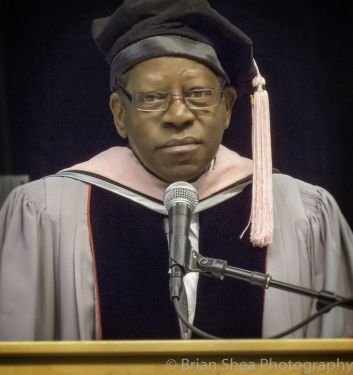Interviews
- Details
- Written by: Giovanni "Gio" Pilato
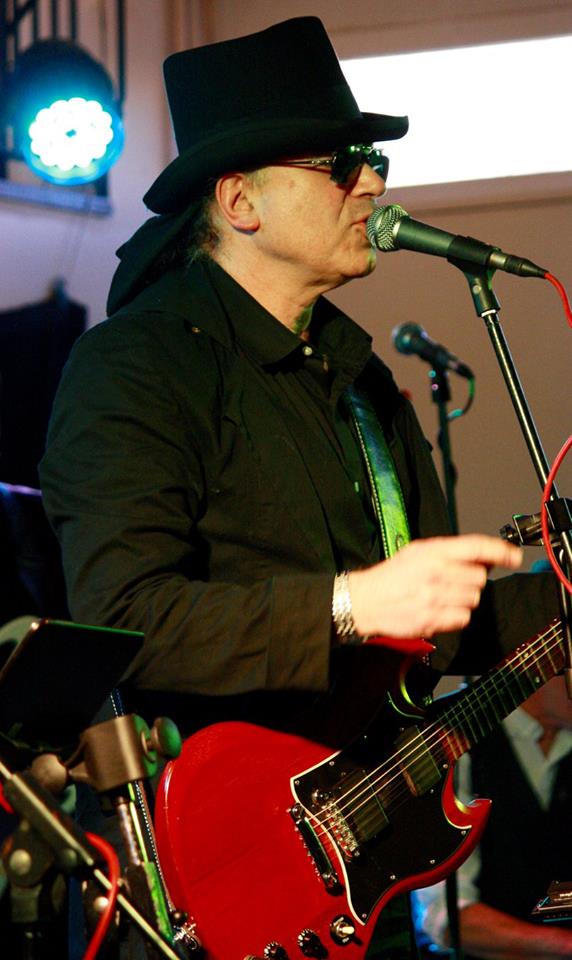
(Photo by Graham Chapman)
"Russell will be here in a second" announces the gentle voice and the smile of Joanne Alexander, member of The Hitman Blues Band and, most importantly, wife of Russell "The Hitman" Alexander, frontman and band leader of this fabulous collective from New York. The band has released just few months ago one of the most entertaining albums of the 2016, The World Moves On (previously reviewed on our website) and Bluebird Reviews couldn't miss the chance to meet and discuss about the new album with The Man Himself, Russell Alexander.
We meet the band in one of their European dates, more precisely in London, UK, in one of the most iconic and historic venues of the UK capital, The 100 Club. Alexander is immaculately dressed in his stage suite with his typical Blues Top Hat that he loves to feature almost every time that he performses and welcomes Bluebird Reviews with a huge smile and warm handshake.
BBR - Russell, welcome on Bluebird Reviews and many congratulations on your new album The World Moves On. How long did it take to assemble together the tracks, old and new that ended up on your new record?
RA - All together, probably about three or four months. I started the pre-production in January, then got few things sorted and then we started recording in February. The record had to be done by the end of March. I was told by my publicist that end of March was the ultimate deadline and if we didn't have the record ready by the beginning of April, there would have been no promotion opportunities for the forthcoming tour at all. As you can understand, no pressure at all! (giggles). But despite all that, I am very happy about the end result and everything worked out really well.
BBR - The Blues has been defined, through the years, in many different ways. How would you define, in your own words, your very personal take on this genre that you like to call Original Modern Blues?
RA - See, the blues is a collective genre. You can go back all the way to the W.C. Handy days and then do a kind of progression up, by going through artists like Bessie Smith, Lonnie Johnson, Blind Willie McTell, Charlie Patton and then moving another notch to people like Johnny Guitar Watson, Elmore James, Howlin' Wolf. By creating such a great music platform, the artists belonging to the rock scene grabbed on and said "Oh, so this is where our genre come from!". Finally understanding where all this started, the rock artists made their own things, filling the gap, through their artistry, between the Chicago Blues style and the rock scene, based on the roots created by the artists I mentioned before. People like Fleetwood Mac, Cream, Eric Clapton, then as the days went by, guys like Johnny Winter, Jimi Hendrix, Stevie Ray Vaughan did so really beautifully. All of us musicians apply our visions to what we consider blues because we all have a different view about what blues is. Even Stevie Ray Vaughan, back in those days, he was told: "Man, that is not blues". But sure it was, it was performed just in a different way. If we want the blues to survive and I am certain that it will survive, it has to evolve because any music genres need evolution, including the blues, otherwise it's going to disappear.
BBR - During the making of The World Moves On, did any of the songs change their shape, whilst you were recording the album?
RA - A lot of times that does happen but on this particular album it didn't. When I walked into the studio, I knew already pretty much how I want the album to sound like. We had a keyboardist, Kevin Bents, who came in and threw in a lot of his own ideas. Some of the songs were starting in a way and finishing in a completely different way. That was the way we used to work on some of our earlier albums and if you hear the original demos of those albums and the way the tunes actually came out, they were completely different. But this one was pretty smooth and I have gotta say I might be finally getting the hang of it at this point, I am not sure but I feel I am getting there (smiles).
BBR - The band has been together for quite some time, now. How much has the sound of The Hitman Blues Band developed, through the years?
RA - Well, as you know I had many different players with me over the years. I started the band in 1989 and at the time, it was merely a cover band. Since those days, I went into a lot of changes of personnel and I believe that the only musician that has been with me the longest is Mike Porter (bass guitar), which has been with me for 12-13 years. I have worked previously with Mike Snyder, who is now playing with us both Baritone Sax and keyboards, many times before, since the mid-80's in different other projects but not on a long running like with Mike. This new record is a bit like the sum of our history, as Hitman Blues Band. You can hear in it new versions of songs from my previous records, like Catch 22 Blues from my very first album. That tune has got a special meaning for me, because I had the honour of having my father (Ray Alexander, excellent jazz artist) playing with me, which was a real treat. But then, if you compare, say, that track to the newer stuff, something like I'll Be Moving On or The World Moves On, for example, you can certainly hear the different approach we had on the new songs in comparison to the older one we revisited on the album. I guess that approaching songs in a different way, through time, is part of the evolution of any artist. One great thing was that, once I heard the job that the Team did in re-mixing and re-mastering versions of the older tunes, I was over the moon. Some of those tunes go back all the way to 2000 and it is amazing how fresh and so contemporary they sound still now
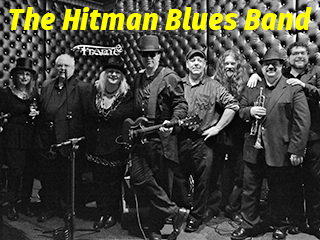
BBR - Our viewers are very interested to know about the genesis of your nickname The Hitman, Russell. They really hope you have never shot anybody in your life!
RA - No, I can reassure you on that. "They called me Hanging Johnny, away boys away but I never hang nobody" (Hanging Johnny by The Great Big Sea). I have got that nickname first because I knew so many tunes from the blues charts, back in the days, stuff from, I don't know, 1920s to 1970s all by heart. As you get older, however, you tend not to keep up quite as much as when I was younger and due to the fact that I am so focused and concentrated now with my band, you obviously lose, through time, any incentive to keep up with the Blues Charts and all that. The way that I dressed, also, already back in the mid-late 80's was very much noticed by the fans. I remember, in that period, a friend of mine coming to see me playing in an open jam session and when I walked on stage, he shouted "Hey, look, here comes The Hitman". So I thought that, considering that so many people called me in that way for many different reasons, it was wise for me to keep that name and that is what I did.
BBR - When we reviewed your record at Bluebird Review, we truly admired the capacity of the band to stick religiously to the tradition of the blues and at the same time, the ability to spice up that sound through your personal artistic touch. Which blues artists have inspired you and made you love so much this genre from the beginning?
RA - Oh boy, how long have you got? That's a huge list to make because there are so many different kind of blues. All the different styles of people like Robert Johnson, Blind Willie McTell, Charlie Patton, just to mention very few, they had such a big impact on my musical formation. But that is not all. If you go through each decade of blues with me, I can go on for hours. Maybe the first time I was really exposed to blues, as genre, was by listening in my young age to people like Cream, Canned Heat, Jethro Tull and a lot of Progressive Rock. One day I started listening to Elvis Presley's Sun Session album and I was amazed by how that album was based on blues. Through the years, then, people like Stevie Ray Vaughan and The Blues Brothers revitilised the interest about blues even further and that was really a cool moment for the genre. Then I started working my way backward, musically, discovering, a bit like the rock artists of the 70's I mentioned previously, that the fundament, the ground of that music was the blues. I guess that this is one of the positive sides of getting older. You get a bit more patient, sit down and dig deeper into the sound that was the genesis of what came after. It gives you the opportunity to appreciate where all started and how it started, something that when you are a younger and maybe blinded by the current music you hear on the radio, you don't consider at all.
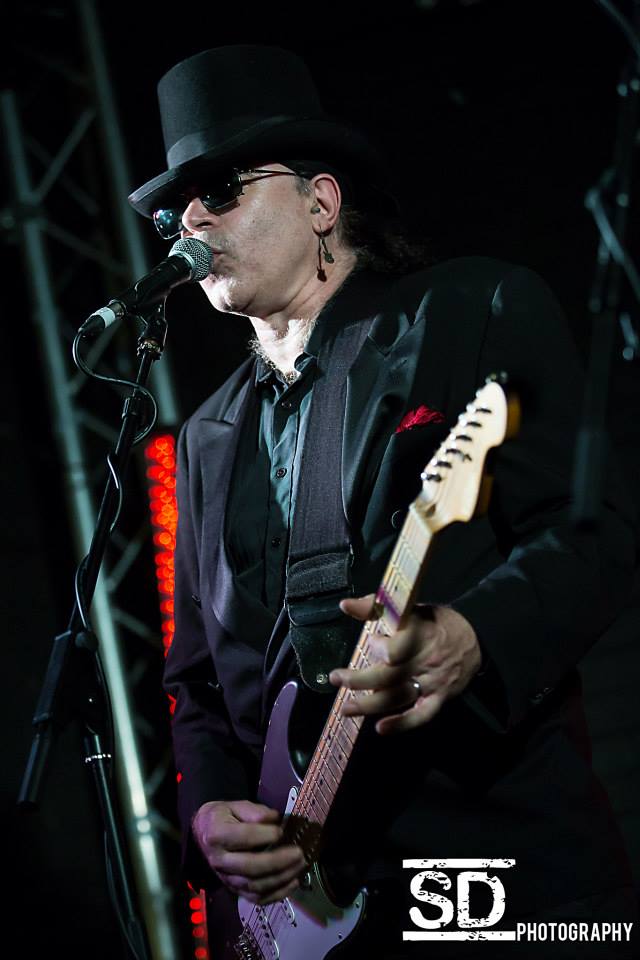
(Photo by SD Photography)
BBR - How come that you decided to add to the new album five re-worked tracks from your previous records and not doing an album of all original material?
RA - I had a lot of people saying to me "Hey, you have got these older albums with plenty of great tunes, you should really consider to re-release them because they really sound cool. I had already some new songs ready and I didn't want to make an album made entirely of my old tunes either. So, we asked to the fans and we also discuss within the band which songs of our back catalogue would have been more appropriate to be chosen for this album and in the end, I have got to say I am pretty happy with the ones we chose.
BBR - Russell, you have been in Europe to play many times before. How different do European audiences react to your music in comparison to American ones?
RA - The typical answer would be that in Europe they are much more respectful, they listen carefully to the songs and so on. In reality, I don't think that there is so much difference between European and American audiences because our American fans can be as respectful as the European crowds. I also think that, another similarity we find often in our crowds is the amount of loudness, which is mostly the result of how much alcohol consumption there has been on a particular show, it doesn't matter where you are! (chuckles). There is also a fair amount of dancing but, again, it would be entirely depending by how much the crowd would be sober or not sober. Either way, what I generally find awesome about any type of audiences is that they will come and listen to the blues, no matter if it is Delta, Chicago Blues or any other kind of. Because it's the spirit of the blues that bonds them together, it's not important matter of what nationality they can be or their blues preferences. They come just and only for the blues, because they find a connection with it. They come because they want to support it and feel connected to it. Most of all, they want to see it performed live and feel the power of the blues.
Giovanni "Gio" Pilato
- Details
- Written by: Giovanni "Gio" Pilato
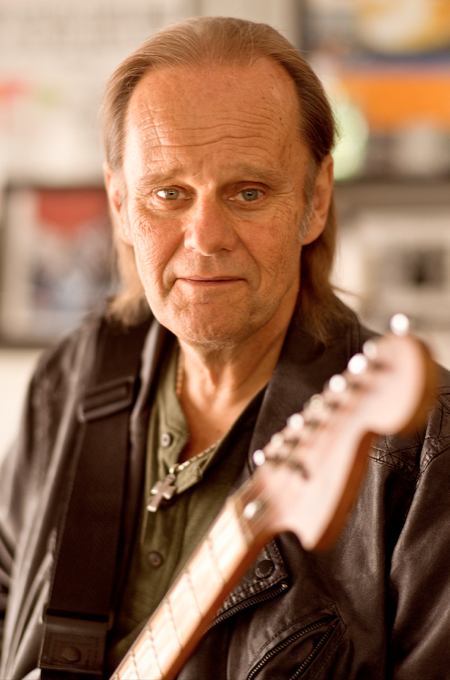
(Photo By Greg Waterman)
It doesn't happen very often that we humans get so close to Afterlife and, for some unexplicable reasons that we like to call miracles, we manage to make a comeback and live our lives in perfect harmony.
Walter Trout from Huntingdon Beach, California belongs certainly to this very restrict elite of people able to make an extraordinary comeback to life. When virtually everybody was convinced that he would never, even if he would have survived to the liver failure disease he went through, make a return to the music scene, this very talented guitarist and singer/songwriter took by surprise the whole world making a full recovery.
In the space of a year, Trout didn't just make his return to music activity but also released a studio album called Battle Scars, the chronicle in music of his battle for life, followed by a brand new live album called ALive In Amsterdam.
Bluebird Reviews is honoured to reunite, once again, with not only a Blues/Rock Guitar Hero but also with an old friend of our website to discuss about the new live album, why the concept of family matters so much to the American artist and why Amsterdam and The Netherlands have got such a special place in his heart.
BBR - Hi Walter, thank you so much for talking to us again at Bluebird Reviews. ALive In Amsterdam is a live recording that frames an important moment of your life and career, given what you have been through during the last 2/3 years. Which are the immediate memories that you have of that fabulous night of music?
WT - Well, I remember it was, to be perfectly honest with you, a rather stressful night. There were many logistic sides to be put together. My wife Marie was trying to coordinate all the different aspects of the concert and its recording so it was rather stressful for her too. I do particularly remember one thing, though, about that night. When I walked on stage, that roar from the crowd and the incredible love that the fans showed me in Amsterdam had the same intensity of the one I felt at the Royal Albert Hall in London, for the Leadbelly Tribute Night. It was truly special.
BBR - I guess that The Netherlands is one of those special places for you, as an artist. That is the place where the first Walter Trout Fan Club started and among all the places in the world where you have been playing throughout your career, The Netherlands is a country that feels a special connection with your music. What is the secret of the special bond that links you and your music to the Dutch crowds?
WT - I couldn't tell you, really. From the very first time I played in The Netherlands with my band, they have just embraced my music and myself completely. The first time ever I went there to play with the Walter Trout Band, I was amazed by the number of the people that showed up. In many countries where we had previously performed, at our very first concert there might have been something like ten people, because we hadn't made our mark yet, in such countries. Then the numbers would have increased with each passing gig. When we did our first show in The Netherlands, in those days, we were expecting pretty much the same amount of people we had in other places. Instead, the whole place was sold out and when we walked on stage the crowd went completely crazy and it was such a beautiful sensation. I was also very lucky, in a way, that in the very same country, later in 1990, I had this major hit with the song The Love That We Once Knew. That song was so successful, in The Netherlands, that it reached the No. 1 in their music charts! I couldn't believe that my song was at the top spot, followed by Madonna, Bon Jovi and Brian Adams. You have no idea how great that felt on many levels. Not only because, for once in my career, I reached the No. 1 with one of my songs in a country but also because The Love That We Once Knew allowed me to reach, through that Number One spot, a bigger and wider audience, becoming also a phenomenal radio hit. You can hear, on my new live album that, as soon as I go into that song while I was doing the Encore, they all start singing it. There is also another song of mine called Say Goodbye To The Blues, present on the live album too and written in cooperation with a dear friend of mine Tim Jahnigen which, for five consecutive years on the national Classic Rock station in The Netherlands has been voted by the people as the best blues song of all time. What a honour for me. Those two songs have been my most important hits in that part of the world and I am so thankful and overwhelmed for the love that the people of The Netherlands has showed me since the beginning. Words cannot even start to explain my gratitude to them.
BBR - ALive In Amsterdam's tracklist includes, as one would expect, many tracks from your latest studio album Battle Scars. Do you ever feel uncomfortable to play certain songs from that album that rewind back to a difficult time in your life?
WT - I don't feel uncomfortable but sometimes some songs affect me emotionally, because, as I am singing those lyrics, it feels like I am re-living the experience. Occasionally, it really takes that pain back in my mind and I must confess that more than once, on my last tour, at the end of one or two of the songs of that album, I needed to hide for few seconds from the audience and have a little moment on my own. I always like to be able to live the lyrics of the songs I write but I guess that, in Battle Scars, there are times in which that emotional involvement and by living those lyrics in a particular time of my life it gets a bit too much even for me.
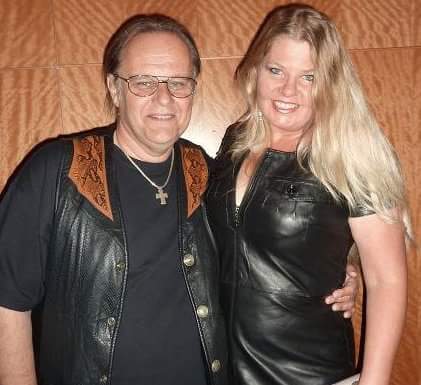
Walter Trout & his wife Dr. Marie Trout
BBR - This live record sees an energised Walter Trout on many levels. Your ability to play guitar is second to none but the really surprising factor is that your singing style has reached some new fabulous highs. How much has the first leg of the Battle Scars Tour helped you to reach this new found and incredible singing versatility?
WT - That is hard to say, because, when I was very ill, I remember I could barely speak. I did not have any strength at all and if you remember my vocals on the album The Blues Came Callin', I finished that record after a really long and painful process, right before I went to the hospital. There was a song on that album that I wrote for my wife Marie, called Nobody Moves Me Like You Do and when I hear that song, I can remember and hear the struggle I faced in recording those vocals. I literally had to sing that song one line at the time, take a break for five minutes, get a bit of strength back and then press the Record button again to sing the next line, because I did not have any energy left in me. So, when I started to get my strength back, to sing became a brand new and rather joyous expression for me, like I never felt before. It was the same for the guitar playing. When something like that is taken away from you and then that thing comes back through hard work, it becomes more meaningful and important for you then it was before. When I am singing, it feels very liberating for me because I feel like I gained that power again, in my voice.
BBR - You have covered a few songs of some of your fellow blues/rock musicians throughout your career, as also shown in this new live album in which you play songs from John Lee Hooker, BB King and Luther Allison's repertoire. Has the fact that you have been recently to Jeff Healey's memorial inspired you to record one of his tracks, in the future?
WT - I might do that but, to be honest with you, I had not really thought about it. I am just starting to think about making another studio album, to be made probably in January or February 2017 and that is on top of my agenda. But it would be a good idea recording some of Jeff's music. I loved his music and I was very lucky to get to know him even before he became famous worldwide. When I went to play in Canada, back then, there was, as opening act, this local kid that I had never heard of and I remember that myself and Coco Montoya sat in the wings of the stage and we had our jaws dropping to the ground by watching Jeff playing. I have got to watch him go from being a little, local kid in Canada to become an international music hero. I have been so privileged to see him blossoming, not just as an artist but also as human being. Jeff was really a very special person in many ways.
BBR - You allowed a lot of artistic freedom, on ALive In Amsterdam, to Sammy, Michael, Johnny, your son Jon and your long time friend musician Andrew Elt. Do you feel like this new album is not just your personal "Thank You" to all the fans that have supported you through thick and thin in your career but also to your "On The Road" family?
WT - Of course. Those guys were there with me all the way. When I was sick, they told me that if I could ever get back to music, they would have been there for me. They had the chance to go on and play with other people but they waited for me. Michael (Leisure, drummer of the band) once told me: "I don't care if Roger Daltrey hires me to play drums. If you get to the point where you can play again and you really want to play again, I am here for you". All the boys in the band told me that. I so much love those guys. I am so in debt with those fellas for hanging there with me for almost two years. They prayed and they waited for me, having no idea if I would ever get back again to music and I want always to be there for them as much as they were there for me. It is a real family On The Road. All of them auditioned for me, no matter whether they have been in the band just for one year, like Johnny (Griparic, the band's bass player) or something like 9 years for Michael or even for 16 years like Sammy (Avila, the band's keyboard player). But they all auditioned and when I hired each of them, I said to all of them from Day One that I wanted to make this band feel like a family because I want us to be a family, when we are on stage. I want that feeling to translate into our live shows. We are not just four guys going up there, trying to play together and put up a good show but we are four guys that really care, respect and love each other. I want us to communicate that to the crowd, as we play. I always wanted that. I remember the time when I started to be a musician, age 14. My ultimate goal that I really wanted to achieve was to be in a band like The Beatles. They really blew my mind and I saw their cameraderie and their tight, close relationship, especially when they first came on the scene. They stuck together like one sole unity, like one person and I thought that was a wonderful thing, what an incredible bond. The actual concept of a tight, close, hard working band like The Beatles, that was exactly what I wanted my band to be.
BBR - Amsterdam, coincidentally, is not only the place in which you recorded your splendid new live album but also the place in which you shared the stage with the all-stars project called Supersonic Blues Machine, on their very first live performance ever. Can you share with us any hidden backstage and onstage tales of that special concert?
WT - Man, that was an incredible experience and that band is really an amazing group of musicians. One thing I can tell you is that, all those guys, as accomplished, revered, esteemed and respected by the world of music as they are, they are all just so down to earth and a group of very humble people. We got there a couple of days early to do a bit more rehearsal because we never played together live before, so I got to be around them for a while. I was amazed about the fact that there was no egos involved, no attitudes and we truly enjoyed hanging out together. We all became very close friends and, since that show, we all keep in touch very frequently. We exchange a lot of e-mails between myself, Billy Gibbons, Robben Ford or even, at times, jam together, like few nights ago when Fabrizio (Grossi, bass player with Supersonic Blues Machine) came to a club where I was testing some songs with my band for the forthcoming Tour and he just joined in on stage with us. They are, sincerely, a great group of guys. We have another show, as Supersonic Blues Machine, coming up in August in Norway, at the Notodden Blues Festival and funnily enough, I am going to headline one night with my band and then next night I am going to play with those guys. Joining us as well, that night, there will be also another fantastic musician, Steve Lukather. It's an absolutely joy playing with them. I mean, take somebody like Alex Alessandroni on keyboard, which has played with artists like Christina Aguilera or Stevie Wonder. What an incredible musician Alex is and he is just the nicest guy! Then there is Doug Rappoport on guitar, insanely great musician too. Then you have, of course, the three fellas which are the core of the Supersonic Blues Machine. Kenny Aronoff on drums is a real force of nature, it's like heaving a steamed locomotive within the band. Lance Lopez on guitar, a truly fabulous guitarist and such a humble guy. Fabrizio Grossi on bass is a hugely talented bass player and the nicest guy ever. As an extra added bonus, I have got to tell you also that, after the show in Amsterdam with the SBM, I felt this tap on shoulder and there was Bonnie Raitt, congratulating me for the show! I have always been impressed by her immense talent. The first time I saw her playing was in 1970, at The Philadelphia Folk Festival. She was there, alone on stage playing acoustic and I was so mesmerised by that performance. I still am. I gotta tell you also that, after that show, we were just going away from the venue and I got this message via a Social Network from Bonnie's bass player Hutch Hutchinson, which coincidentally played bass on my albums, Common Ground and The Outsider too. The message said "Hey Man, we were looking for you because Bonnie wanted you to sit in" but sadly, by that time, we had left already. What a shame, really. To play a song with Bonnie is something that I really want to do before I die.
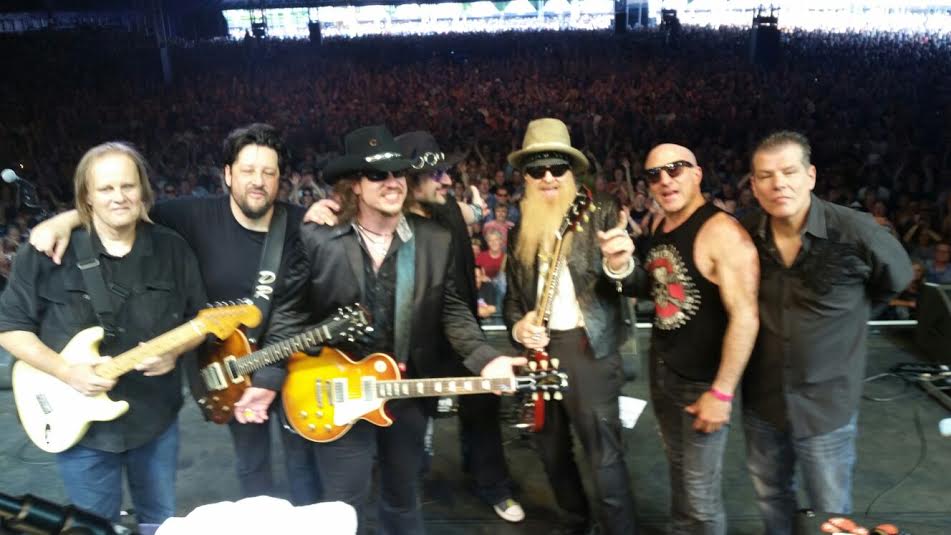
(Photo By P. Scalabrino) From L to R: Walter Trout, Doug Rappoport, Lance Lopez, Fabrizio Grossi, Billy Gibbons, Kenny Aronoff & Alex Alessandroni
BBR - You have just started the 2nd leg of the Battle Scars World Tour. Have you planned to play pretty much the same setlist present on ALive In Amsterdam or are you going to surprise your fans by playing different songs from your extensive catalogue?
WT - We have few songs now that we have added to the show. I call them new songs but, in reality, they are old songs that we rehearsed lately in front of people by doing few unannounced club gigs so we could test those songs in front of a crowd. I am talking about tunes like May Be A Fool or Prisoner Of A Dream, amongst others. The nucleus of the show will be still though my latest studio album, Battle Scars.
BBR - Have you had any chance to write new material, while you have been on tour in the past 12 months?
WT - Haven't thought about it at all, no. I am not the kind of guy that write songs, whilst On The Road. I do write lyrics, when I am travelling. I do sit in the back of the van, sometimes, with my headphones so I can tune out from the world. I think about things and I write them down, making those lyrics becoming poetry as best as I can. Then, when I am back home, I try to put them to music and combine the two together. Every time that I get in my hotel room, after a show, I am not the type of guy that gets out the guitar and play. I rather prefer to save myself and my energies for the stage. After all, I am on stage every night for two hours and I completely immerse myself, mentally and physically to the live show. I think it's just wise for me to use my strength for the shows and write new stuff when I am back home.
BBR - "Music is my healer" is one of the most favourite slogans of a fabulous young guitarist and dear friend of yours, Laurence Jones. How much has music been your healer, not just in recent times but throughout your whole life, Walter?
WT - It's been my healer for my whole life. That's why I called my book Rescue From Reality. Music provided me a refuge for a very insane childhood. It provided me a sanctuary that I can escape into, where nobody could touch or hurt me. After the period in which I have been sick, to be able to come back up on stage, in that splendid venue that is the Royal Albert Hall in London and, after almost two years of absence from a stage, to get that reception from the crowd, it lifted my spirit and my soul in an indescribable way. I realised, after that night, that music is now for me something different, something that allows me to get even deeper into myself and closer to my emotions. It gives me the chance to experience a part of myself and my emotions that I didn't even know it was there.
Giovanni "Gio" Pilato
- Details
- Written by: Giovanni "Gio" Pilato

(Photo by Sean Brand)
It's one of the most gratifying feeling, for who writes about music, to see that there are still artists out there capable of making their sound to grow and evolve and still be successful and original, rather than trying to feed their fans with the same ole music recipe over and over again.
The South African guitar prodigy Dan Patlansky is, undoubtedly, one of those rare above mentioned exceptions and we, at Bluebird Reviews, are truly privileged to catch up once again with this tremendously skilled artist whilst he is touring Europe to promote his brand new album called Introvertigo. Where many were expecting Patlansky to repeat from A to Z the same formula that took his previous record, Dear Silence Thieves to the top of the blues and rock charts all over the world, his new album, Introvertigo, instead takes the listener to the next level of the South African artist's musical journey, moving into territories that embrace genres very close to Patlansky's heart, like blues, rock and funk. When we start our conversation with this very charismatic musician, it's almost inevitable for Bluebird Reviews to ask Patlansky whether he feels that Introvertigo is the natural development of the 2014's splendid album Dear Silence Thieves or it's rather another step in the musical journey of an artist in continous evolution. "I think it's a bit of both. It's an ongoing evolution, that I feel it will never stop evolving. This is due to myself having a whole lot of different musical influences each time I make an album. I am very open to different music styles and when I find something that really intrigues me, in a particular time of my life, I like to dig deeper into that particular genre, study carefully that music direction and make it my own. I do believe that in many ways, as you were saying, this album is the natural evolution of Dear Silence Thieves. Having said that, I also think that Introvertigo is very close to Dear Silence Thieves in many ways because I used the same producer, the same guy mixing the album and the sound is, at times, resembling parts of the Dear Silence Thieves album. In essence, Introvertigo is a record with a bunch of new songs, moving towards a slightly different direction than my previous record. But I feel it's a kind of an obvious thing to happen, being my music in constant evolution".
One thing that Patlansky has not changed on Introvertigo is indeed the producer. Theo Crous has been worked with the South African gunslinger on both Dear Silence Thieves and on the new record too. "Naturally, given the great success of Dear Silence Thieves, I thought that was common sense for me working again with Theo Crous. Introvertigo was much easier to record, in comparison to Dear Silence Thieves because this time around there was a better understanding, a better chemistry and a better trust between myself and Theo. On my previous record, we were arguing a lot more about the direction I was going to take musically but the outcome of Dear Silence Thieves proved that his input on the album was spot on. When we enter the studio for the Introvertigo sessions, we knew already the way we both like to work, therefore the recording process of the new album was much smoother than the previous one we did together. Theo comes from a music background that has not got the blues on the far front but he rather comes from a more commercial rock scene. That aspect worked perfectly with me, because the core of my music is essentially blues and, as I was writing the new songs, I found this common rock ground with Theo in which my music core was fitting perfectly in. The outcome of Introvertigo was very satisfactory both for me and Theo because I have got what I wanted musically from the album and he has got what he wanted the record to sound like. In my opinion, it was a win-win result for the two of us and we hope, for the fans too".
During the last couple of years, Patlansky has been in Europe to promote his latest two albums several times, including this one. Out of the many countries in the world in which this young and talented artist has performed, the United Kingdom seems to have built a special bond with Patlansky and his music. "Personally, I have always thought that the United Kingdom had stronger musical traditions and knowledge than many other countries in the world. When it comes to blues/rock, in particular, you can easily sense that there is a strong music scene in this part of the world. One of the aspects that I have noticed in this last couple of years, whenever I had the chance to play in the UK, was the fact that when you get people in UK that is really into your music, they will become your most loyal fans ever. The crowds here in UK are really great ones to play for, very appreciative of my music. In a short amount of time, I feel that myself and the UK fans have built together a very strong connection. I am not saying this because we are in London right now, as we speak, but please believe me when I say that the United Kingdom is among my most favourite places in the world to play live. There is such a healthy music scene here, not just for me but also for other artists and I am very excited to come back here in the UK and play whenever I have the opportunity to do so".
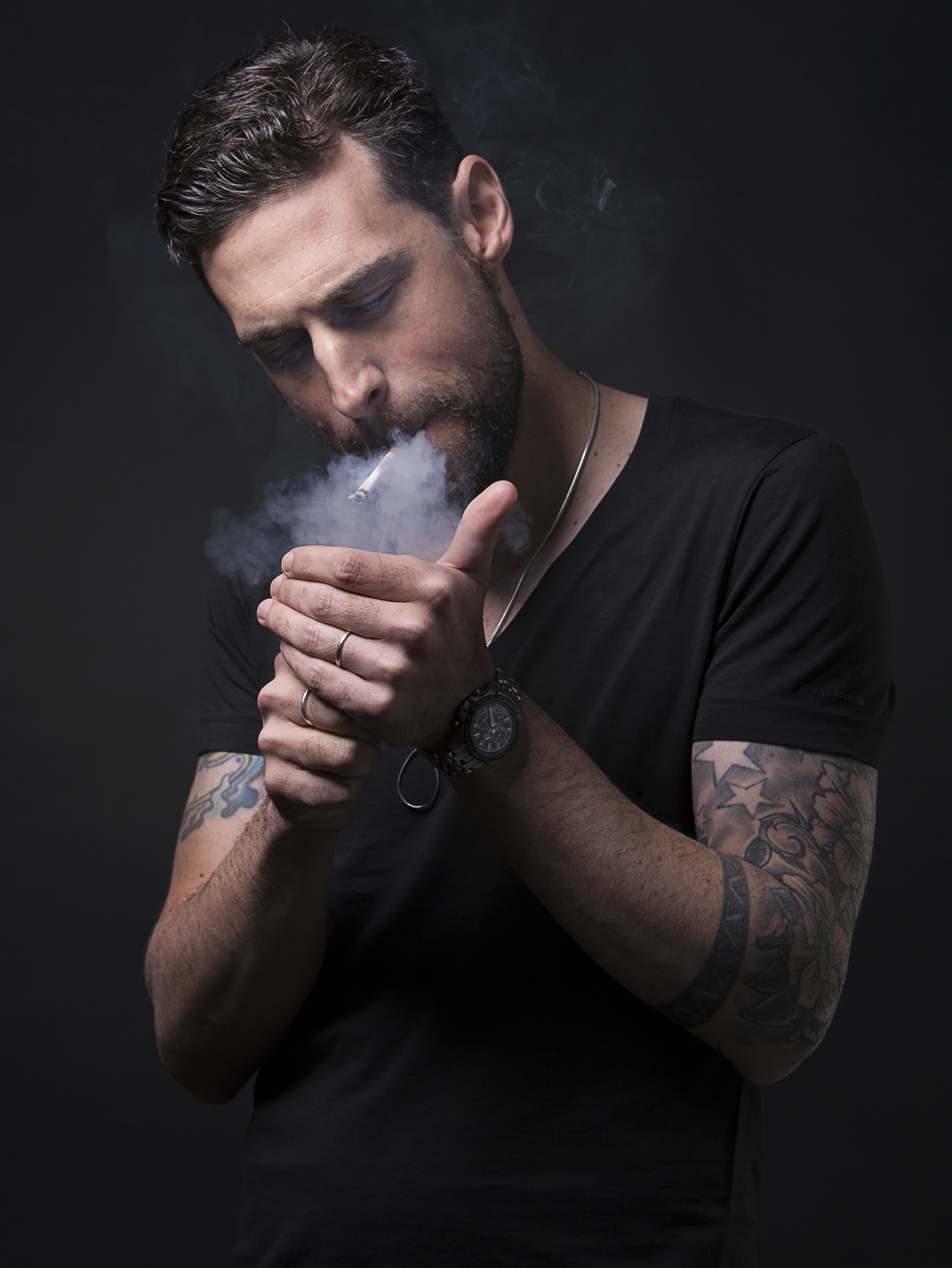
(Photo by Bakkes Images)
One of Patlansky's fondest memories, as a musician, goes back to 2015, when he had the opportunity to tour together with the Guitar Maestro Joe Satriani. To play with such an enormously talented musician, must surely have inspired Patlansky musically in the build-up to record Introvertigo. "Without a doubt. It has been one of the greatest honours of my life to be on Tour with such an incredible artist like Joe and trust me, the Man is a real force of nature. He is such a nice guy and from a personal point of view, one of the nicest artists I have ever met in my career. He made myself and my band feel at home every day, when we were touring with him and his crew. When you are a support artist, sometimes you may feel like you are in the way of things but that was not the case at all with Joe. I learned a lot from him, how can you not? What I really appreciated of him beside his stature as a guitarist, is the incredible level of consistancy he applies in his performances, night after night. He never has a night off or plays under par, never. That shows really how much he has got his head right, which is a skill that just masterful musicians like Satriani have. It was a world class experience working with him that I shall treasure forever".
Whilst touring with Satriani in 2015, Patlansky had the opportunity to test live, in many occasions, two very powerful tracks with his audience that ended up then in Introvertigo, Run and Stop The Blessing. Bluebird Reviews is curious to know whether Patlansky thought already, at the time, that those two songs would have been the driving force of the new album, in terms of radio airplay. "To be honest with you, the only reason why we were playing those two tracks in our setlists while touring with Satriani, it was because at the time those songs were the only two tracks ready from the new album. Playing those tracks gave us the opportunity not just to test them live but also the chance to get an immediate feedback from the crowds long before the album was released. The fact that Stop The Messing became a single here in UK, on radio stations like Planet Rock, was purely coincidental, as it was just coincidental what brought those two songs in the spotlight too. But I am glad it happened that way, because it gets always tough for me to pick a single song from any of my records and decide which would be a better single than another or more radio friendly. Every song is like a child for me and you don't get to pick and choose any of your kids, because you don't want to disappoint anybody, therefore I am glad that radio stations do that job on my behalf".
Patlansky is a truly eclectic artist on many different levels. Not only a fabulous guitarist and an excellent singer, Patlansky's songwriting gets better and better as the years go by. One of the songs from Introvertigo, called Western Decay, is not just a splendidly written tune but also one that gives the real feeling that the South African artist means every word he sings, when he worries about the future of the world we are living in. "That is a song about how much the world has changed from when I was a kid and the amount of freedom I had as a young boy, in comparison to this present time. I guess that life in South Africa, back in the days, was pretty much like here in Europe or in the rest of the world. You could go out with your friends, coming back when the sun was down and my parents wouldn't worry at all, because everything was going to be good. It's a total different game, now. Since I have become a father, I can actually sense on my own skin how much things have changed and it's a sad thing to realise. You get the feeling that those days of freedom are long gone and they are never coming back again, because the world is getting more and more crazy, as the years go by. That's what the song is all about. As I said, it really means a lot to me because it makes me appreciate even more the way that I have been raised and I feel blessed for that. At the same time, it makes me feel even more responsible about trying to be the best parent I can possibly be, especially in crazy times like these".
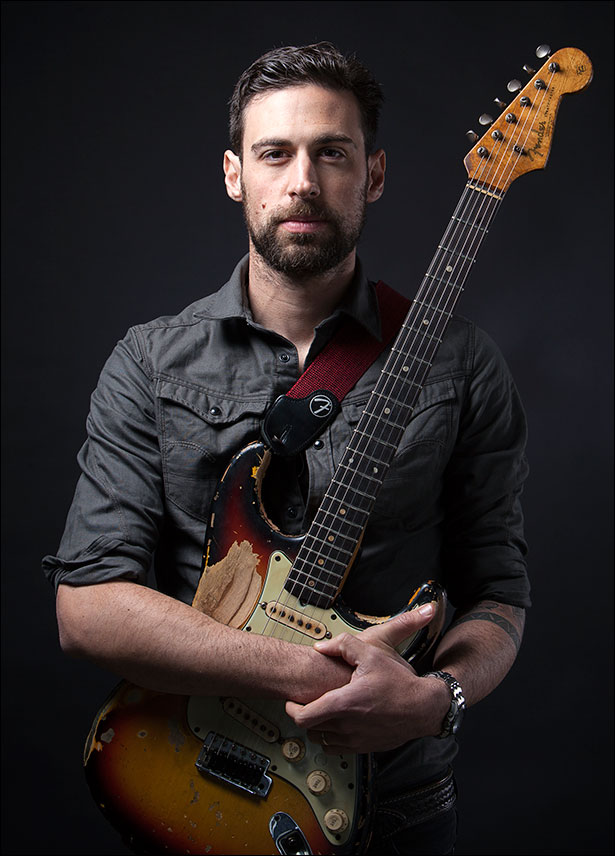
(Photo by Bakkes Images)
Introvertigo is an album that doesn't just showcase Patlansky's love for blues but also for a quintessentially 90's rock sound, superbly executed through his unmistakable artistic touch. We ask Dan Patlansky which were the 90's rock bands that made a particular impact on him. "Definitely Soundgarden. They were such a big influence for me. Them and the Rage Against The Machine. When the project Audioslave came up, back in 2000, that was for me the best of both worlds I could possibly ask for, musically, because that band was including 3/4 of the RATM plus Soundgarden's Chris Cornell as the lead singer. Cornell is for me one of the best singers ever. Obviously, I listened to many other big rock bands of the 90's, people like Nirvana, that kind of stuff. Truth to be told, I don't think that the 90's was the best ever music era, at least for me personally but there were certainly some decent stuff made in that decade".
Another highly interesting tune present on Introvertigo is, without a doubt, Heartbeat. In this song, Patlansky displays in full his ability on both acoustic and electric guitar, by mixing and alternating the two different guitar types on the same track with very inspired brilliancy. "The genesis of that song it's quite interesting, because that was the last song we recorded for the new album. The only thing I had for that song were the lyrics but I had no music ready at all for that tune. So we started messing around in the studio and then, little by little, we came up with the riff, then the melody and so we thought "Hey, we are getting somewhere, here!". One of the winning factors about that song, for me , was that it wasn't an over-thought tune at all. It was almost a last minute kind of thing. We did not know until the very end whether Heartbeat was going to become an acoustic tune or an electric one, because we had the platform to build the structure of the song in both ways. I like to play my music differently, either whispered in a more soft and gentle way through an acoustic gutar or more loud and boombastic through an electric guitar. It's a great accomplishment this song, for me, because it shows two different dimensions of my music style. Although it's complicate to play this song live, because I cannot play the acoustic and the electric guitar at the same time when I am on stage. You need some kind of magicians to be able to do that! (chuckles). It's possibly one of my most favourite tracks of the albums, because of the unusual dynamic occurring on Heartbeat".
Patlansky is a truly eclectic musician able to express his talent using different layers of music, in the same way he expresses his personal feeling, through those different music layers. By using different music styles as instruments of expressions, one would hope that, at least, the musical Vertigos are finally over for the South African artist. "Possibly. I agree about what you just said about feelings. Music is a platform that allows me to express who I am, as every art form does with any artists. It can be a painter, a photographer, any kind of. Obviously, rock is a far easier platform for me to express feelings like anger through, because has got a raw sound in itself, an "in-your-face" type of music approach. You may be able, I guess, to express anger through blues too but, because I love both genres, I guess that this album gave me the opportunity to dislodge feelings like anger and love using different sounds, the ones I really love. Fundamentally, my idea of Introvertigo is like, say, going out shopping at Xmas time and be surrounded by hundreds of people doing exactly the same. That idea of chaos surrounding you, the feeling that you don't want to be there, that is kind of what I was trying to express by using a made up word like Introvertigo. But you know what? You can dislodge any kind of feeling for a while through a record, but an Introvertigo kind of feeling is something I feel I have to live for the rest of my life with, because chaos is something that will never cease to exist, in every aspects of modern society. With the sole exception of when I am on stage playing my music or being surrounded by the love of my family, the best feelings ever in the whole world".
Giovanni "Gio" Pilato
Introvertigo is out now and it's available on Amazon
- Details
- Written by: Giovanni "Gio" Pilato
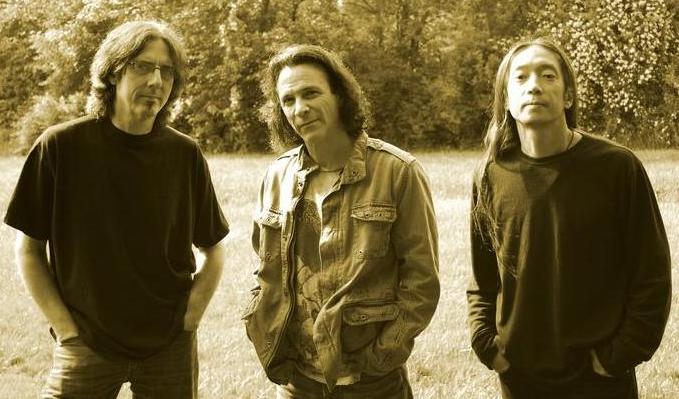
The Jelly Jam - (From L to R) Ty Tabor (Vocals, Guitar), Rod Morgenstein (Drums), John Myung (Bass)
There are things in the world of music that happen really fast, some other that take all the time they need to be put in place. The latter certainly applies to The Jelly Jam, a formidable supergroup of avant-garde rock made by King's X guitarist Ty Tabor, Dream Theater's bass player John Myung and Winger/The Dixie Dregs drummer Rod Morgenstein.
It took 4 albums, including the freshly released Profit and 15 years of history as The Jelly Jam (although just as a side project while performing with their respective bands) to make finally possible to get the band touring for the first time ever. Their brand new album, Profit, is a marvellous and excellently played concept album about an imaginary Prophet, embarking an heroic attempt to save the world and to open the eyes of Those Who Will Not See.
To talk about the band's new album, their forthcoming US Tour and their history as The Jelly Jam, Bluebird Reviews meets Rod Morgenstein, whose career as a drummer includes several Grammy nominations with The Dixie Dregs and multiple chart topping singles with the rock band Winger.
BBR - Hi Rod, welcome to Bluebird Reviews, many congratuations to you and the band for your new, splendid album. Profit is a record full of spirituality and symbolism. Who, within the band, came up with the idea of writing a concept album like this?
RM - We have to thank Ty Tabor for coming up with this concept. In fact, when the creative process began, about three years ago, John, TY and I got together and we each had a handful of ideas. It wasn't a huge amount but, just by jamming a little bit together, the ideas just started flowing. After a week or 10 days of hanging out together, we ended up nearly having an album worth of music, in terms of drums sections being cut, the bass tracks done and a fair amount of the guitar parts done too. When we parted company, Ty had, at that stage all his melodies completed but being also the lyricist and the vocalist of the band, he still had no idea on what the album, conceptually, was going to be all about. A little while after that recording session, which was the fourth for the band altogether in almost 15 years, in conversation Ty told John and I that the whole idea about the album was coming together in his head and that it would be a concept album. The whole idea about the album, lyrically, was all about Ty and his creative juice. Once we went back home, after that session, he had the opportunity to gather together the material we recorded, and by adding all the ideas he had in mind, we ended up with what I consider a truly excellent album.
BBR - It has been 5 years since your last record as a collective, Shall We Descend. How much do you feel the band's sound has moved on and developed since that album?
RM - When we started recording Shall We Descend, we realised that our style was developing nicely and we were creating an interesting sound, recognisable to everybody as The Jelly Jam. Like many musicians, when I finish to record an album, I barely listen to it again, because of all the time that myself and the band spent creating the music, recording it etc. You may listen to it a bunch of times, once it is completed, to ensure that you are completely satisfied about it. But then something kicks in and you almost get tired to listen to it over and over again so you move on to other things. The fact that this is the first time we are going on tour, as a band, meant that we all needed to go back to our previous records and listen to them again, in order to gather a setlist for the shows. I found myself listening to material that I had not listened to for almost ten years! When that happened, I was so pleasantly surprised to hear how strong the music was at the time and still is now and how cohesive we have been as a band since Day 1. That said, this new record has, to me, such a maturity of sound. I guess it is because, although the three of us have not played a gig together yet, in those four different periods of time when we met in the studio, we have done a fair amount of playing together and getting to know each other better as musicians. I feel that there is a comfort level that kicks in, when you start doing record after record and that is why we are getting more locked in, by playing with John and Ty. Also, due to the fact that this is a concept album and every song is related to the next one, there is, within the band, the strong feeling that we have further evolved, on Profit, in terms of sound and cohesiveness. Given how much our sound has moved on through this new album, it's going to be even more interesting to see what happens when we convene together next time in a studio to start a new record. I am sure it's going to be, again, something completely different but still with a distinctive Jelly Jam sound.
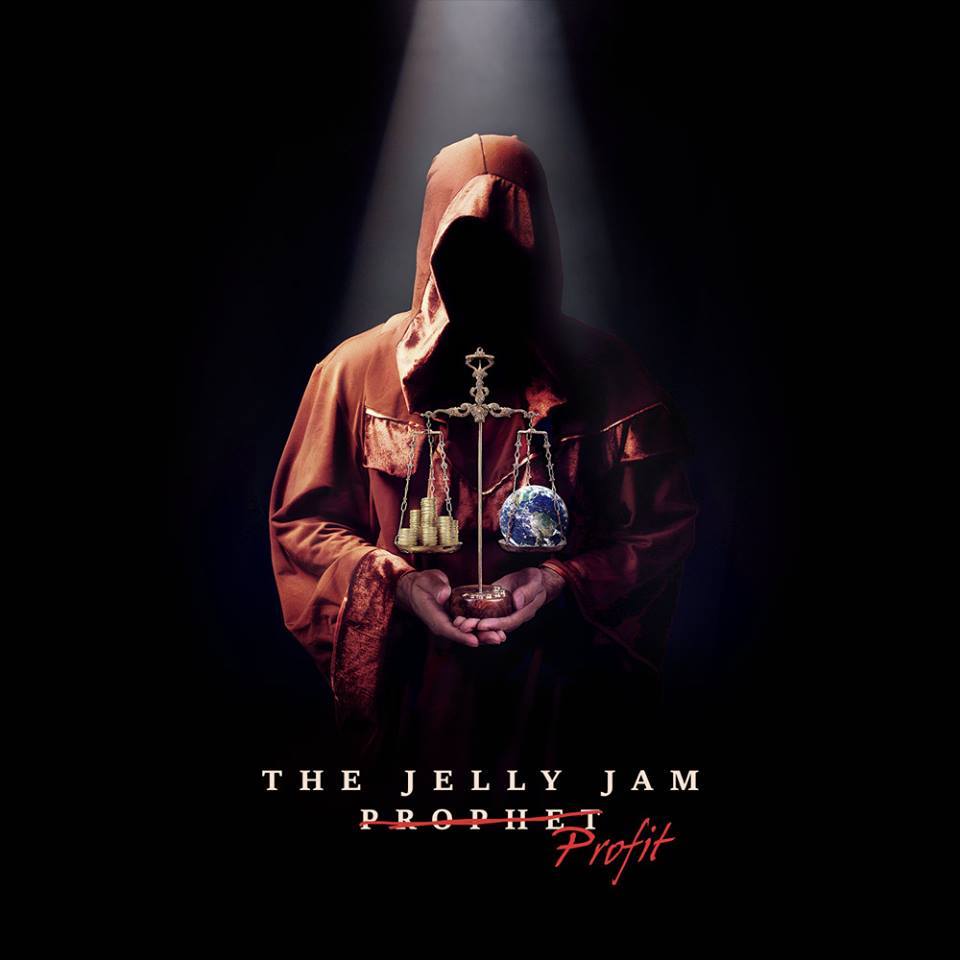
BBR - Do you feel that The Jelly Jam project allows you, as a musician, to unleash your drumming skills in a way that suits you more than any other music project you have been involved into, throughout your glorious career?
RM - Let's see.. I have truly loved every band that I have played in and I say that because to me, the greatest challenge, as a musician, is to try to be true to the style of music that you are playing every time. What I mean by that is, when I play in Winger, I don't want to have people walking away saying stuff like "What the hell is a jazz-fusion drummer playing in a hard-rock band?". When people would come to see the Dixie Dregs, in the same way, I wouldn't want people walking away and saying: "What the heck is a meat and potato rock drummer doing in an instrumental/fusion/rock/jazz band?". My goal has always been, regardless of which band I am playing with, to have people walking away from a gig, saying "God, I really, really dig that drummer, he really played true to the band's style and he also added elements to the band's sound that I have never heard that way before". Say, for example, the style of Winger's music today. It is quite different from what we were doing back in the 80's. I have always tried, and hopefully achieved with Winger, not just to hit the drums hard, in true rock style, but also to add my experience as a fusion drummer too, by inserting in the sound, here and there, curves and twists that no one can hear from a normal rock drummer. Take for example, one of our biggest hits as Winger back in the late 80's called Seventeen, which was one of the most played videos on MTV. There is a little section, right in the end of the guitar solo where when we recorded that song, the producer asked me to add something that no one has ever heard before in a rock song. I used a technique called Beat Displacement, which makes the music sound like it has been turned upside down and at the time, this was something totally innovative to hear in the sound of a rock band. Truth be told, I was specifically brought into Winger to bring these kind of foreign musical elements to the sound of the band. Nowadays, with Winger, we apply much more to our sound those element of musical escapism. But coming back to your original question, it's not that I feel that The Jelly Jam gives me more freedom to express myself as a musician more than any other band I have been involved in. It's just a matter of a different challenge, for me, because I love playing with The Jelly Jam as much as I love playing with any band I am or I have been involved into. In terms of freedom, there is certainly lot of open space in The Jelly Jam music, as far as what I am able to do, as a drummer. We are not AC/DC, where you hear exactly the same drum beat style almost every time, say, in an album like Back In Black. Which I totally understand, because it is exactly what is needed for that kind of music. But in The Jelly Jam, it is a much busier style of playing and the drums have a lot of freedom to change things up without impacting the song negatively. I wouldn't say that is like being in a jam band, with The Jelly Jam. It's kind of 50/50 between improvisation and mixing things up a little and the way we had originally planned to build a song. With John and TY, due to the fact that they are such superb musicians, nothing that I can do can really thrill them anyway! (chuckle).
BBR - I believe that a song like Perfect Lines defines you perfectly, as a band, with all those twist and turns, typical of The Jelly Jam musical philosophy. Is this song solely related to The Prophet's state of mind and his personal journey on this record or is it more an autobiographical song for any of the band members?
RM - That's an interesting question. I don't really know, to be honest. The only one that could answer this question would be just Ty. I am just assuming that everything, lyrically, was just part of the story and the concept of the record, without having anything to do with anybody in the band. That was a very interesting song in the way it came together. I forgot how far into that song we were, when we recorded it but a certain point, the guys asked me: "Hey Rod, could you just sit at the piano and write something that sounds classical, 'cause that might feel really great with the song?". So I just sat down and start noodling and eventually I came up with the piano part that you can hear in the song. Ty wrote a really beautiful vocal melody on top of it, really wonderful. I think it is the most Prog-Rock orientated song on our new album. I read a review the other day from someone who is totally into Prog-Rock kind of stuff. He kept going on saying things like "That was great, I want to hear more Prog stuff like that by The Jelly Jam". We just want all to know that The Jelly Jam is its own thing. It's not Dream Theater, it's not King's X, not any of the bands that I or the boys play in. Whatever you want to call it, this is The Jelly Jam sound. Over the course of the four albums, the sound of our band has grown constantly and it has moved into different directions. Yes, our style includes surely some progressive elements but we don't think of ourselves as a Prog band. We are more than that. I remember the days with the Dixie Dregs. We, in the band, knew that the majority of our fans were musicians of some sort. With The Jelly Jam, you don't have to be necessarily a musician to love our music. We don't do those 10 minutes-plus long epic tracks. Instead, our songs last for a standard duration of 3-4 minutes, with proper verses and choruses. That allows virtually anybody, musician or non-musician, to listen to our songs and be totally absorbed by them.
BBR - Profit is, to me, the record where all of you guys have really stretched your tremendous skills as musicians with outstanding results. Do you feel like the band, through this record, has finally found the "Treasure chest that will save them from the rest" (excerpt from the song Heaven)?
RM - I do, I truly do. We have done enough recordings and, little by little, I think we now feel comfortable hanging together as friends and musicians, like we know each other better every time we get together. I do believe that this can be heard on our new album as well. I am absolutely positive that our connection as artists and friends will grow even more the moment we will get together on a stage and play our songs to our audiences. During the rehearsal period for the live tour, we felt immediately that we were bringing our songs together very quickly and very nicely. The fire and the excitement is there, we are feeling that this tour will bring things within the band to another level. I guess that, by touring for the very first time, we can stop calling The Jelly Jam our side project, as we have done for the last 15 years and calling ourselves, finally, a band. We are going to hit the road in the middle of July for three or four weeks in The United States and we sincerely hope that we can bring our show soon to audiences around the rest of the world too.
BBR - Rod, the original form of what it is now The Jelly Jam was Platypus, where the band was originally a quartet. How difficult has it been to channel the sound of the band from being a quartet to a trio?
RM - It has been very easy. When we started that project, about 17 years ago or so, John called myself, Ty and Derek Sherinian (keyboards), asking whether we wanted to be involved with him in a project all together and we said "Sure, let's do it". The four of us convened at my house in Long Island and each of us came in with some ideas. We did not have yet a clear direction or a concept on what the project would have been all about, therefore each of us came in with one or two songs or simply sketches. We gradually built on the project and if you listen to the first Platypus album, it is really a fun record but it is all over the map, in terms of sounds, starting with high energy to then moving to the next track, which was a very Proggy one, an instrumental kind of song that perhaps would have sat much better in a Dream Theater album. In essence, the Platypus record was fun, yes, but it was a collection of songs that were not related to each other, neither in terms of lyrical content nor musical togetherness. When Derek departed the band, the three of us decided to continue on and since we had done two records together as Platypus, we evolved very naturally and fairly quickly, I have got to say, in this beautiful creature that it is now The Jelly Jam. Something that, to me, it is an incorporation of heavy and vocal-oriented cool rock songs that also add that special musician element to them. It did not take a lot of work or extra effort for the evolution from Platypus to The Jelly Jam to happen. I just remember when John and Ty came to my house to start putting together material for the first The Jelly Jam record. Things came together so quickly and the way we were building song by song was so organic, just by noodling together as an ensemble. By the end of that day we created two of my favourite Jelly Jam tracks of all time, which are I Am The King and I Can't Help You. In our live shows, we are playing both those songs and we are planning to do at least a couple of songs from each of our past records. We are extremely excited about doing these live shows and we are working very hard on making The Jelly Jam touring on a regular basis. I believe it's a doable thing, even considering how busy we individually are with the other bands we are in. And hey, we certainly have plenty of material that we can pick and choose to be played lat our shows, being this our fourth album!
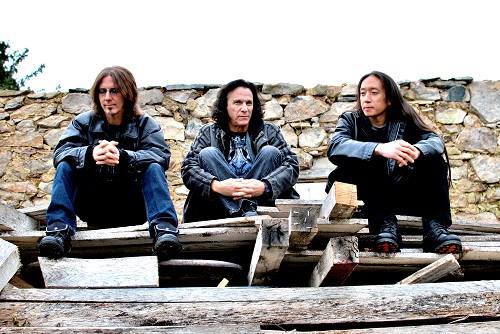
(Photo by Internet Archive)
BBR - Fallen is for me one of the most intense moments of the album. Almost a metaphore of what is happening with the band. The right album falling at the right time, falling with the right concept and the right songs. How special was recording that song, Rod?
RM - Fallen is my favourite song on the record, at the moment. It is perhaps, the most basic and simple drumming that I have ever played on a record. As a drummer, my favourite stuff to be played doesn't need necessarily to be something where I need to show off. Every time I listen to that song, the lyrics get me choked up and Ty's guitar solo it's breathtaking. It's truly magnificent.
BBR - Profit is a record that put The Jelly Jam definitely on the shortlist as one of the best progressive rockbands worldwide. Do you feel like this record is your personal masterpiece to date? Because that is what I think.
RM - Well, I am genuinely excited about this new record. I had no idea it was going to turn out as wonderful as it is. Personally, in all 60 albums I have done in my career with several bands, it gets incredibly hard to say: "Hey, that record is my best record of all time" on any of those albums. But one thing I would say for sure, is that Profit is way up there at the top of the list as one of my most proud achievements as a musician. The cohesiveness on this album is awesome, the storyline is so beautiful, the message is so great. Everything about it is so perfect. I am looking at the cover of the album right now as an LP and I am so damn proud of it, I think the artwork should be hanging in a museum, it's real artistry! Profit is a humongous achievement, I believe, not just for me, but also for Ty and John.
Giovanni "Gio" Pilato
Profit is out now and The Jelly Jam Tour Dates can be found on the band's Official Website
- Details
- Written by: Giovanni "Gio" Pilato

Many people would have been tempted, at a certain moment of their lives, to retrieve back to that comfort zone that is their place of birth. The place where you were born and raised, where your family and best friends live and you know they will always be there for you.
Ryan McGarvey has never been tempted by that. Since a very young age, the Guitarist and Singer/Songwriter from Albuquerque, New Mexico has always aimed to go to the next step of his musical journey, to risk the unknown and to push himself always to the limit.
He has certainly succeeded on that. McGarvey, since his 2007 debut album Forward In Reverse has not just collected numerous awards and played with the cream of the blues/rock worldwide but also gained the unanimous blessing of the music press on being one of the most inspired and talented guitarists of the last decade of rock and roll.
In the last couple of years, McGarvey has been incessantly touring his latest album to date, the 2014 The Road Chosen and Bluebird Reviews has had the opportunity to talk to this extraordinary artist at The Borderline in London, United Kingdom, where we discussed about life on tour and what the future has got installed for McGarvey.
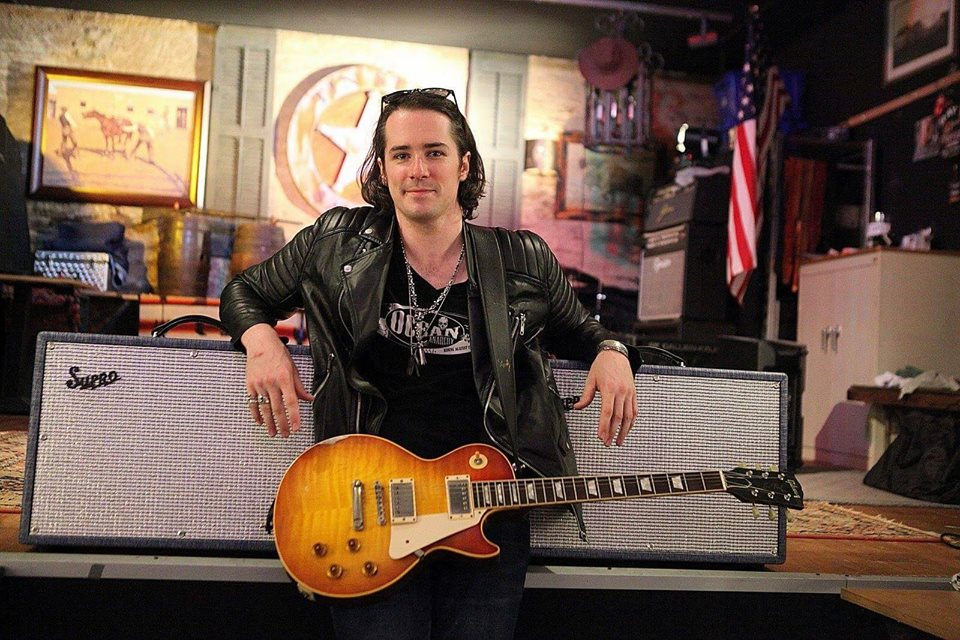
(Photo courtesy by Supro)
BBR - Ryan, welcome on Bluebird Reviews, great to finally meet you. This has been, so far, a sort of Neverending Tour for you, after the 2014 The Road Chosen album. Have you written new material whilst touring the world, in the last couple of years? If so, when can your fans expect to hear a new Ryan McGarvey's album?
RMG - I have indeed. I'm expecting to release the new album by this fall and then to be back on tour again to support the new album. There are quite few musical projects I am involved into right now. There should be a live CD and DVD hopefully released this summer to celebrate the amazing time I had on the last couple of years on tour. Then I have also an album of rock material ready to go, an album of blues songs ready as well, which is something I wanted to do for a very long time and I am also considering to release an album of acoustic material, which is something else that I really wanted to release for quite some time. Quite a lot going on. We are playing some new stuff in what I call right now Part 2 of The Road Chosen Tour and it's very interesting for me to see the way the crowds react to the new songs.
BBR - You have been always recognised as one of the most inspired and talented guitarists worldwide of the last decade of blues/rock. Given how constantly you are touring and playing night after night, how often do you get to do some practice on your guitars?
RMG - I get that a lot and I am also a complete hypocrit with myself because I am always the one telling everyone "Hey, you have to practice more because if you skip a day, you'll need two days to get back to where you were". And that comes from somebody that never gets to practice anymore, really! (chuckles). I guess that, the fact we get to play every night, helps me to make it up for that. At the end of the day, I pick up a guitar at least once a day anyway, even when I am at home, when trying something new, like a new guitar riff or an idea for a song I have in my head. So the chances I get to skip practicing on guitars are virtually zero.
BBR - Ryan, out of all the three album you have written so far, which is the song you are most proud of?
RMG - It's a good question. I was trying to think about this the other day and I guess, for me, is more a matter of having a favourite song for each album I have written so far. It's all related to state of minds, feelings, on why I have written some particular lyrics on a specific track in a particular time and what they mean to me. On some of the slower songs, the ballads, I can picture exactly what I was writing about. To those slower tunes, I also like to give things a twist, because I like to write and sing my songs in a way that doesn't feel necessarily related to personal stuff but they could be songs in which virtually everyone can see themselves and their lives reflected in somehow. I love the fact that after the shows, people come up to me and say how much they felt connected to some of the songs and what they meant to them. To come back to your original question, I would say that some of my favourite songs from my albums, perhaps the ones closer to my heart are My Heart To You, Always & Forever and So Close To Heaven. I guess I like those songs particularly because I liked the arrangements and every aspects about those tunes.
BBR - Many fans and people in the music industry have always applauded and highly appreciated the fact that you release albums containing solely original material. Have you been ever tempted to record and release a cover album containing songs of artists of the past and present, very close to your heart?
RMG - I thought of doing something like that. Most of my favourite music, growing up, have been covered by the late great Jeff Healey. I have always loved the way that he covered songs in a very wide spectrum and in a very cool way. We have been playing live few covers through the years and I would love the idea of recording an album of covers, one day, and to give them my own interpretation but still respecting the core of the songs themselves. Maybe someday will happen, you can never tell!
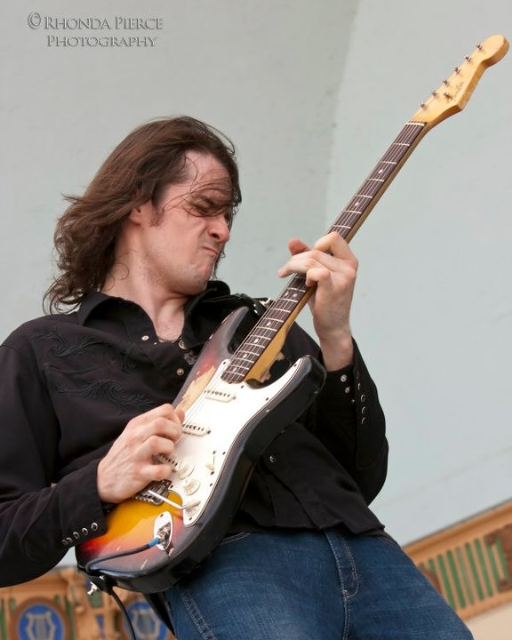
(Photo by Rhonda Pierce0
BBR - Ryan, why do you think that a genre like the blues has been able to survive for almost a century now, in an industry where even iconic bands like Radiohead do not sell records anymore as much as they used to?
RMG - I guess that the main reason is that the blues it's one of the very few pure and honest genres. It's one of those styles that speaks very openly to people, you just can't fake it. I have to say, though, that yes, certainly the blues is a very genuine and honest genre but I guess that what you asked is mostly related to the type of artist you are watching, on the night, more than the genre that he or she is playing. It happened and still happens to me, at times, to see somebody playing live and to think "This guy really sucks". But some other time there have been artists that have been mindblowing to watch. Their music was speaking to people and the crowds were finding a true connection with what the artist was playing because they were able to feel what he was playing. But, coming back to your question, at the very end, it all comes back to the blues. The younger generations may go to a rock, a rap or even a country music concert and during the performance, not to be able to figure out that some of the guitar riffs on some of the songs may come straight from the blues. The root of all genres.
BBR - How was the music scene of Albuquerque, back when you were a kid and how eventually did it influence your growth as a musician?
RMG - It was pretty cool. There was a good number of bands, blues bands back in those days. I remember playing in a bar band for something like 4-5 hours every night, for good crowds or sometimes even for a couple of people. But into my head, back then I always had goals and I have always been a very motivated person and wanted to move forward. I remember that, at the time, there was a club I always wanted to play into but I had not managed so far to get any bookings there. When I then succeeded to finally play there, I was getting so many booking request from that venue that I was getting a bit bored and tired of it and just wanted to move to something bigger, more challenging for me as a musician. I have always wanted to move forward, in my career and grow up more and more as an artist. Growing up musically, in Albuquerque, has been certainly a positively, formative experience for me.
BBR - Ryan, the number of followers you have in Europe is almost superior to the one you have back in the States. I have bumped into few people today telling me that this is is going to be the fourth or fifth time they are coming and watching you playing. What is really the secret behind your phenomenal popularity?
RMG - To be honest with you, it is really hard right now, in the States, touring regularly for an artist. Over here, in Europe, it is completely a different world. The kind of promotion we get in Europe is different and bigger. It's different for an artist or a band in terms of fans appreciation too. The fans here in Europe come and see us, on an average in a Tour, something like five or six times, following us around in many different parts of the continent. Maybe the fans here in Europe have got more opportunities to follow us around because countries are in a much closer proximities then in the States. But it's truly remarkable, here, as I said, not just the promotion that we get as artists but also the loyalty of the European fans. If you get somebody coming to one of our shows for the first time and he or she will love what they hear, than the fan here will not just come to more than one show but will also buy your entire discography! And at the next show, that very same fan will know already by heart all the lyrics of each song and sing them loud. It's so rewarding to meet the crowds after our shows, all dressed up in our merchandise, coming up to me saying: "Man, I saw your advertising poster in the streets and I couldn't miss the chance to come and see you and get to hear you playing live again", which is so awesome to hear for me. I had that happening at home in the States sometime but that certainly doesn't happen as often as it happens here.
BBR - B.B. King once stated: "I've said that playing the blues is like having to be black twice. Stevie Ray Vaughan missed on both counts, but I never noticed". What colours has music brought into your life as a musician and as a human being?
RMG - That's a tough question. It's a very beautiful one, wonderful for sure, although I cannot immediately tell you what the colour might be. I think of this musical environment as a tight-knit big family, where people you have never met in your life which you are a fan of or bought their CDs have the extraordinary capacity to bond with you almost immediately. The minute you run into them, it becomes a completely mutual thing, because you find out they feel exactly the same thing about you. And if you see someone that you really admire, you feel connected to, it becomes, as I said, an instantenous bond. I remember, once, I was at a merchandise table in Denver, Colorado, at a music festival, after one of our shows. After we had been there for so long time, meeting and greeting fans, selling our CDs and all the merchandise, there was still a huge crowd waiting to meet us but the organization told us to move away because there wasn't time left anymore. As we were leaving, a guy steps out of the queue and comes to me saying: "Hey Man, I just wanted to say I really enjoyed the show" and all that stuff. As I thanked him and we were parting company, he said something like he was going on stage and play later and headlining the show, so I said: "Wait a minute. Are you Bernard Allison?" And he said Yes, and I went "Oh, my gosh, I love your music, Man". So, to cut a long story short, in the end, we hugged each other, like old friends would do, with all the people around us taking photos and what have you. It was like that special feeling that gets through me when I get to see friends like Kenny Wayne (Shepherd) or Joe Bonamassa, probably two of my closest musical friends. The special bonding, the cameraderie, that great friendship on and off the stage. Hey, I think I made up my mind about the colour you asked in your question. Let's go for red, a very harmonic colour, which defines probably in the best way possible what I just said.
Giovanni "Gio" Pilato
